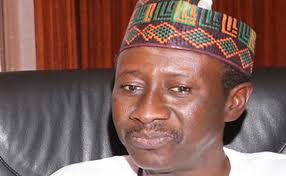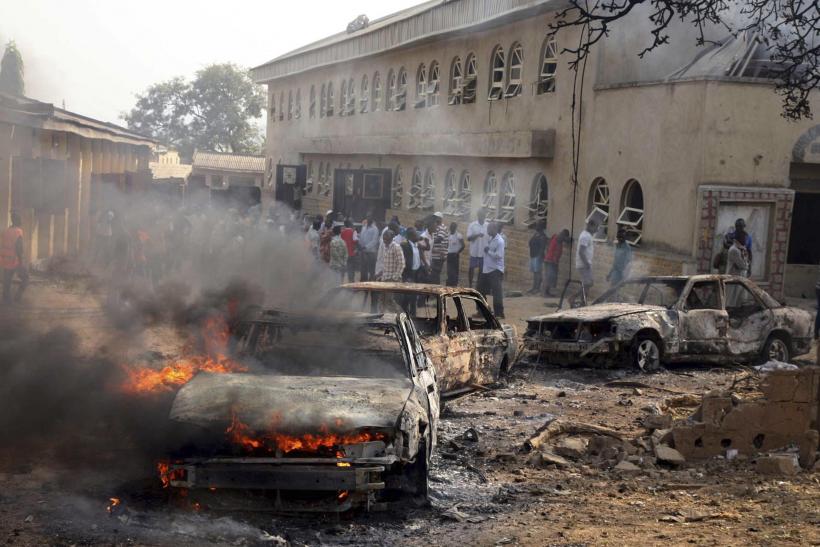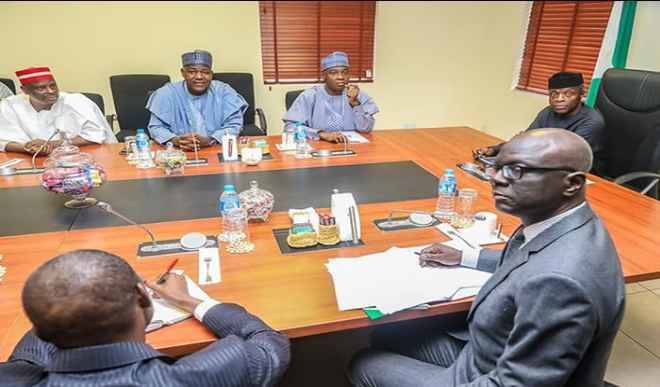[INSIGHT]: Is NSA’s role in The Presidency ambiguous?

By Theophilus Abbah
Nigerians were embarrassed this week to learn that President Muhammadu Buhari’s kitchen cabinet was in disarray over who-does-what in the difficult battle against the hydra-headed insecurity in the country. In a nutshell, a leaked memo divulged the frustration that President Buhari’s National Security Adviser, General Mohammed Babagana Monguno, has endured in the hands of the Chief of Staff to Buhari, Mr Abba Kyari. It sounded like an oxymoron that civilian Kyari has usurped the powers which should naturally belong to an Army General. More surprising was President Buhari’s alleged response to the former Chief of Defense Intelligence’s complaint, which was said to be “mind his business and focus on his job”. So, what is Monguno’s job, according to the Act that establishes the Office of the National Security Adviser to the President? Does anyone take advantage of the contents of the Act in the relationship among Buhari’s kitchen cabinet?

Monguno
The National Security Act spells out the duties of the NSA as follows:
(1) For the purpose of co-ordinating the intelligence activities of the National Security Agencies set up under section I of this Act, there shall be appointed by the President a Co-ordinator on National Security.
(2) The Co-ordinator on National Security shall be a principal staff officer in the office of the President.
(a) advising the President on matters concerning the intelligence activities of the agencies;
(b) making recommendations in relation to the activities of the agencies to the President, as contingencies may warrant;
(c) correlating and evaluating intelligence reports relating to the national security and providing the appropriate dissemination of such intelligence within Government, using existing facilities as the President may direct;
(d) determining the number and level of staff to be employed by each agency established pursuant to section I of this Act and organising the transfer and posting of staff, especially the transfer and posting of existing staff of the Nigerian Security Organisation established pursuant to the Nigerian Security Organisation Act 1976, repealed by section 7 (1) of this Act;
(e) doing such other things in connection with the foregoing provisions of this section as the President may, from time to time, determine.
This section of the Act contains words and phrases which lend themselves to dual interpretations, and therefore create a kind of linguistic ambiguity that could be exploited. It is a known fact that the convivial relationship between law and language is very firm. Law and language are like Siamese Twins. Law is couched in language, just as language is one of the foremost instruments of interpreting what every legal artifact means, perhaps in both letter and spirit.

President Muhammadu Buhari
The preamble to the duties of the NSA’s office specifically states that the person occupying that position should be ‘Coordinator on National Security’. This phrase presupposes that the NSA should be the rallying point in the country on issues relating to national security. The meaning of the word, coordinator, according to Oxford Advanced Learners’ Dictionary, is “a person whose job is to organize events or activities and to negotiate with others in order to ensure they work together effectively.” For this reason, such person must have a measure of expertise and versatility in those activities he coordinates. The second clause to closely look at is “shall be a principal staff officer in the office of the President.” This means that though the NSA has a ‘national’ assignment, he is a high-level [principal] staff in the President’s office. It is, therefore, clear that the framers of this Act understood the importance of the tasks of NSA to the point that he must be close to the president of the country.
However, in capturing the NSA’s duties, the writers of the Act limited his responsibilities to the collation of intelligence information and advising the President on their implications. This Act strictly ties him to the president, and less to security agencies, and the evidence is in phrases referring to the president in each item that spells out the NSA’s duties. They include ‘advising the President,’ ‘making recommendations…to the president,’ ‘as the President may direct,’ and ‘as the President may…determine.’
The image created by this atmosphere is that of an NSA who has to wait passively for security agencies to submit intelligence reports and he, in turn, analyses for the president’s consumption and decision-making. This is contrary to the perception or expectations of Nigerians of the work of the NSA. Nigerians expect the NSA to be the rallying point, the true coordinator, for all security agencies. Perhaps, the Act that appropriately captures the duties Nigerians expect of the NSA is the Terrorism Prevention Act 2013, which insists that the National Security Adviser actively coordinates the activities of all security agencies. The Act says the NSA shall,
(a) provide support to all relevant security, intelligence, law enforcement agencies and military services to prevent and combat acts of terrorism in Nigeria;
(b) ensure the effective formulation and implementation of a comprehensive counterterrorism strategy for Nigeria;
(c) build capacity for the effective discharge of the functions of all relevant security, intelligence, law enforcement and military services under this Act or any other law on terrorism in Nigeria; and
(d) do such other acts or things that are necessary for the effective performance of the functions of the relevant security and enforcement agencies under this Act.
If this is the understanding of the ’additional’ duties of the NSA in the Presidency, then it could be concluded that someone somewhere is usurping the powers and responsibilities of the NSA. But if the Buhari administration has a contrary strategy that restricts the NSA to those tasks provided in the National Security Act, and not the Terrorism Prevention Act, then the NSA may be overreaching and ambitious by assuming that he has powers that ‘the president’ did not permit him to wield. This point can be inferred from a paragraph in the leaked memo, which says, “… You [recipients of the memo] are reminded that the Chief of Staff to the President is not a presiding head of security, neither is he sworn in an oath of defending the country. As such, unprofessional practices such as presiding over meetings with Service Chiefs and Heads of security organisations as well as Ambassadors and High Commissioners to the exclusion of the NSA and/or supervising Ministers are a violation of the constitution and directly undermine the authority of Mr President. Such acts and continuous meddlesomeness by the Chief of Staff have not only ruptured our security and defence efforts, but have slowed down any meaningful gain that Mr President has sought to achieve.”
In the stories published on many platforms, Nigerians are given the impression that Buhari does not find Monguno competent to carryout this huge responsibility, so he allowed other staff in the presidency to do it. This is not plausible. If the NSA is, or was, not competent, Buhari would have fired him a long time ago. From all indications, Monguno may be given the impression to restrict himself to his job as NSA to the president, and not the coordinator of the country’s counter-terrorism activities, but this is absurd.
In many parts of the world the National Security Adviser to the President plays a crucial role at the national level, not just that of advising the president. For instance, in the United States, the NSA to the president performs such active roles as: “Staffing and supporting the President in national security and foreign policy; advocating and advancing Presidential initiatives within the executive branch of government; injecting a sense of urgency into the interagency process; coordinating those important or consequential initiatives and policies that require the concerted effort of multiple departments and agencies to achieve a Presidential objective; injecting a sense of strategy into the interagency process; and explaining the President’s policies to the public.”
In Canada, the National Security Advisor role was: “created to improve co-ordination and integration of security efforts among government departments. The main function is to support the SPHEP, co-ordinating integrated threat assessment and inter-agency co-operation among security organisations, and briefing the PM and his deputy on national security from an integrated, government-wide perspective.” Here, the person who occupies that position plays an active role in the country’s security sector.
India, on its part, has a National Security Adviser, like Nigeria has. The person who occupies that position performs the following roles: [the] “NSA is the chief executive of the National Security Council (NSC), and the primary advisor to the Prime Minister of India on national and international security. It is the NSA to whom intelligence agencies such as the Research and Analysis Wing and Intelligence Bureau report, rather than directly to the Prime Minister. Due to such vested powers, NSA is a prominent and powerful office in the bureaucracy. The NSA is tasked with regularly advising the Prime Minister on all matters relating to internal and external threats to the country, and oversees strategic issues. The NSA of India also serves as the Prime Minister’s Special Interlocutor on border issues with China, and frequently accompanies the Prime Minister on Foreign State visits.”

Prominent words in NSA’s assignment
In order to avoid the confusion in The Presidency over the roles and powers of the NSA, it may be important for the National Assembly to amend the National Security Act to give clear and robust responsibilities to the NSA. This may not be too difficult to do. It is possible to extract the roles given to the NSA under the Terrorism Prevention Act (2013) and include them in the National Security Act, so that the NSA derives his responsibilities from one statute, instead of crisscrossing from one Act to another in determining what he should do and what he should not do.
Abbah holds a PhD in English (Forensic) Linguistics with emphasis on the intersection between Language and Law, as well as Language and Terrorism.
Sources:
1. Online Oxford Advanced Learners’ Dictionary
2. Nigeria’s National Security Act 1976 (As Amended)
3. Nigeria’s Terrorism (Prevention) Act 2013 (As Amended)
4. Bolton, L. (2017). National Security Office responsibilities and functions. K4D Helpdesk Report. Brighton, UK: Institute of Development Studies



